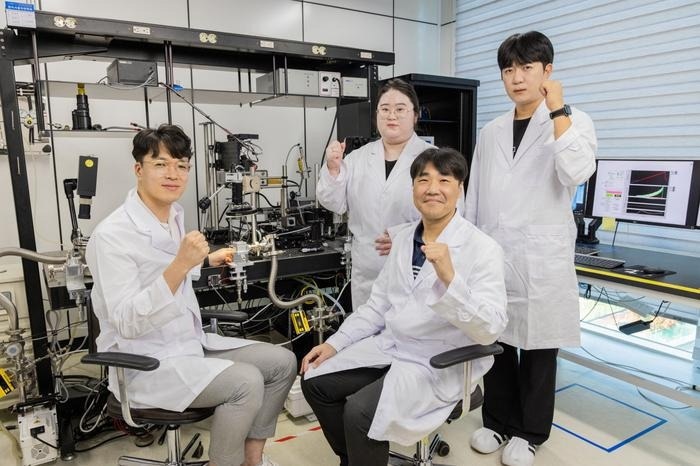Reviewed by Lexie CornerOct 14 2024
The research team at the Korea Electrotechnology Research Institute’s (KERI) Nano Hybrid Technology Research Center, led by Dr. Daeho Kim and Dr. Jong Hwan Park, has developed a novel process technology enabling the ultrafast, 30-second preparation of hard carbon anodes for sodium-ion batteries using microwave induction heating. This study was published in the Chemical Engineering Journal.
 (Front row, from left) Dr. Daeho Kim and Dr. Jong Hwan Park of KERI have developed a groundbreaking process technology to ultrafast preparation of hard carbon, an anode material for sodium ion batteries, using microwave induction heating technology. Image Credit: Korea Electrotechnology Research Institute
(Front row, from left) Dr. Daeho Kim and Dr. Jong Hwan Park of KERI have developed a groundbreaking process technology to ultrafast preparation of hard carbon, an anode material for sodium ion batteries, using microwave induction heating technology. Image Credit: Korea Electrotechnology Research Institute
The sodium-ion battery, a promising next-generation secondary battery, replaces lithium (Li) with sodium (Na), which is more abundant and easier to extract and refine. Sodium, the primary element in salt, is over a thousand times more plentiful than lithium. Additionally, sodium’s lower reactivity makes it more electrochemically stable in batteries, enhancing its suitability for rapid charging and discharging while retaining performance at low temperatures.
Despite these advantages, sodium-ion batteries face challenges, including lower energy density and shorter lifespan than lithium-ion batteries. These issues stem from the complex manufacturing process. Sodium ions are larger than lithium ions, which necessitates the use of hard carbon instead of graphite, the current standard anode material. Hard carbon, with its wider interlayer spacing, accommodates sodium ions better.
However, hard carbon is not naturally occurring and must be artificially produced through a complex process. Hydrocarbon materials, derived from plants and polymers, are heated at high temperatures (over 1,000 °C) in an oxygen-free environment for long periods. This costly and environmentally harmful carbonization process has been one of the main obstacles to the commercialization of sodium-ion batteries.
Drs. Kim and Park's team at the KERI proposed a rapid heating technique using microwave technology—similar to that found in a household microwave oven—to address the challenges of producing sodium-ion battery anodes. To start, they mixed polymers with a small amount of highly conductive carbon nanotubes, creating films. By applying a microwave magnetic field, they selectively heated these films to over 1,400 °C in just 30 seconds, allowing currents to flow through the nanotubes.
This breakthrough builds on KERI's long-standing expertise in using microwave magnetic fields to uniformly heat conductive thin films. This method has drawn significant interest in industries like semiconductors and displays. The research team applied this knowledge to explore anode materials for sodium-ion batteries, yielding promising results.
Key to their success is the team's proprietary "multiphysics simulation" approach, which provided deep insights into the complex reactions that occur when microwave electromagnetic fields interact with nanomaterials. This led to the development of a new method for creating sodium-ion battery anode materials.
The team’s results were recently published in the esteemed Chemical Engineering Journal (IF: 13.3, ranked in the top 3 % by JCR), demonstrating the importance of their findings. Geongbeom Ryoo and Jiwon Shin, two student researchers who took part in KERI’s academia-research collaborative research program, co-authored the study.
Due to recent electric vehicle fires, there has been growing interest in sodium-ion batteries that are safer and function well in colder conditions. However, the carbonization process for anodes has been a significant disadvantage in terms of energy efficiency and cost.
Dr. Jong Hwan Park, Nano Hybrid Technology Research Center of the Korea Electrotechnology Research Institute
Dr. Daeho Kim added, “Our microwave induction heating technology enables fast and easy preparation of hard carbon, which I believe will contribute to the commercialization of sodium-ion batteries.”
The research team plans to continue advancing their technology for the continuous mass production of large-area hard carbon films, aiming to further improve the performance of their anode materials. They also see potential applications for their microwave induction heating technology in other areas, such as high-temperature sintering processes used in all-solid-state batteries, which require additional exploration.
With a domestic patent application already submitted, KERI is optimistic about securing technology transfer agreements with industry partners. The institute expects that this innovative technology will attract considerable interest from companies involved in energy storage materials.
Journal Reference:
Ryoo, G. et. al. (2024) Sub-minute carbonization of polymer/carbon nanotube films by microwave induction heating for ultrafast preparation of hard carbon anodes for sodium-ion batteries. Chemical Engineering Journal. doi.org/10.1016/j.cej.2024.154081